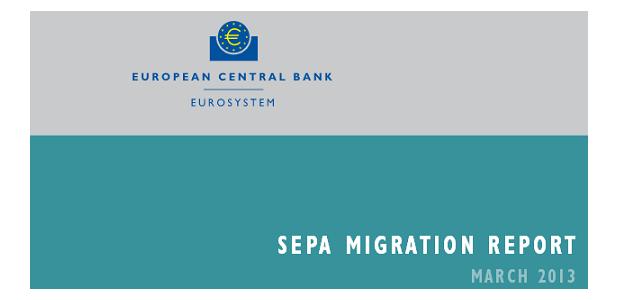ECB publishes first SEPA migration report and warns against risks of late migration

The European Central Bank (ECB) has warned that many companies are leaving Sepa migration too late, leaving themselves open to serious problems when the February 2014 deadline arrives. In a report, the ECB says that with just 11 months until the migration deadline for Sepa (Single euro payments area) credit transfers and direct debits, large swathes of the continent is behind schedule.
While most corporations have already completed the planning phase and know what Sepa will mean for them in practical terms, a number have adopted very late internal deadlines for actual implementation, waiting until the end of 2013. This is a „source of concern”, in particular when it comes direct debits, warns the report. More worryingly, small and medium enterprises’ (SMEs) and local public administrations’ awareness of the programme is still „fragmented and the level of preparedness is rather poor”.
For a project with so many technical details which need to be reflected in end-users’ back-office systems and internal processes, leaving migration until the last minute is „highly undesirable” and could see some companies hit with payment order handling disruption.
Therefore, the ECB has implored big billers, public administrations and SMEs, to migrate „at the earliest stage possible”, preferably by the third quarter, in order to avoid risks which could hit the wider supply chain and would put the Sepa migration at risk.
To avoid such risks, payment service providers need to make customer servicing channels ready for Sepa transactions as soon as possible – no later than the second quarter – and put resources into familiarising end-users with technical, business and contractual issues.
Benoît Cœuré, member of the executive board, ECB, says: „Adapting to Sepa involves adjusting a lot of technical and business procedures over a limited period of time. Projects of this kind should not be left to the last moment. I hope that all stakeholders will take migration to Sepa Payment instruments as a top priority.”
Read the full migration report here: Download the document now 1 mb (PDF File)
ECB publishes first SEPA migration report and warns against risks of late migration

The European Central Bank (ECB) has warned that many companies are leaving Sepa migration too late, leaving themselves open to serious problems when the February 2014 deadline arrives. In a report, the ECB says that with just 11 months until the migration deadline for Sepa (Single euro payments area) credit transfers and direct debits, large swathes of the continent is behind schedule.
While most corporations have already completed the planning phase and know what Sepa will mean for them in practical terms, a number have adopted very late internal deadlines for actual implementation, waiting until the end of 2013. This is a „source of concern”, in particular when it comes direct debits, warns the report. More worryingly, small and medium enterprises’ (SMEs) and local public administrations’ awareness of the programme is still „fragmented and the level of preparedness is rather poor”.
For a project with so many technical details which need to be reflected in end-users’ back-office systems and internal processes, leaving migration until the last minute is „highly undesirable” and could see some companies hit with payment order handling disruption.
Therefore, the ECB has implored big billers, public administrations and SMEs, to migrate „at the earliest stage possible”, preferably by the third quarter, in order to avoid risks which could hit the wider supply chain and would put the Sepa migration at risk.
To avoid such risks, payment service providers need to make customer servicing channels ready for Sepa transactions as soon as possible – no later than the second quarter – and put resources into familiarising end-users with technical, business and contractual issues.
Benoît Cœuré, member of the executive board, ECB, says: „Adapting to Sepa involves adjusting a lot of technical and business procedures over a limited period of time. Projects of this kind should not be left to the last moment. I hope that all stakeholders will take migration to Sepa Payment instruments as a top priority.”
Read the full migration report here: Download the document now 1 mb (PDF File)
Dariusz Mazurkiewicz – CEO at BLIK Polish Payment Standard
Banking 4.0 – „how was the experience for you”
„To be honest I think that Sinaia, your conference, is much better then Davos.”
Many more interesting quotes in the video below:









